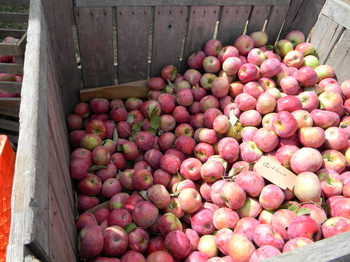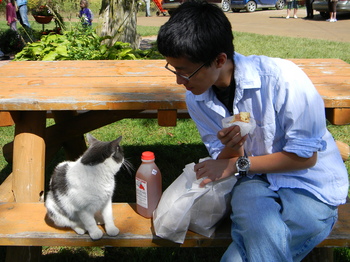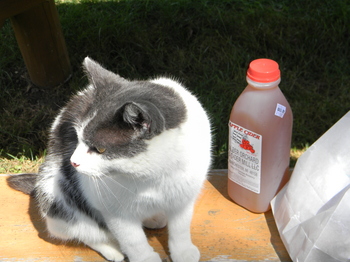It's cider mill season in Michigan: reflections from visits to Alber Orchard and Cider Mill in Manchester

Alber Orchard and Cider Mill gets back to where it all began.
Jessica Levine I Contributor
For me, it all began with pigs. The cider mill I went to as a kid was like Alber Orchard and Cider Mill in Manchester—quiet, pastoral, romantic in mien. My mom would take me and my brother first thing in the morning, when the owner would give us yesterday’s cake doughnuts to throw into Hammy’s expectant maw.
Those were the days.
In A Cook’s Tour, Anthony Bourdain—author, chef and television impresario—waxes nostalgic about family summers in France on the beaches of Arcachon, kid-perfect strips of sand strewn with conches and World War II-era bunkers. He plans a trip back with his brother, Chris.
“We’d go out at the crack of dawn to the oyster parks in the bassin where I enjoyed my first all-important oyster and had my first real food-related epiphany. We’d climb the dune of Pyla again, gorge on sugary pastries and drink as much Bordeaux as we pleased.”
We, readers, are in full-throttle cider mill season; instead of gaufres and Bordeaux, Michiganders, especially this time of year, pine for apple cider and doughnuts. Like Bourdain’s quest back to Arcachon, fall is the time when we make the customary trip to the places that have our hearts—places where barn cats wend between jeaned knees, where the smells of cinnamon, apple and frying dough rock empty bellies, where bees perch on empty rims of cider bottles.

Jessica Levine I Contributor
Places like home. Places like Alber’s on Bethel Church Road.
Purchased by Mike and Therese Bossory in 1999, Alber’s has a 120-year history of giving local residents their cider-and-doughnut fix. The traditions carried on by the original Alber family, however, go back long before they began making cider in 1890.
This is where it all began.
Vinetum
With the British colonists came America’s introduction to apple cider. John Wolridge, British agriculture writer of the late 1600’s, devised a method of extracting cider from apples in his treatise Vinetum britannicum. He writes, “If your Apples be pulpy or mellow, they will yield their juice with difficulty, unless Water be added, but you may press them easily at first, and extract a small quantity of the richest Juice…”
That richest juice, after an approximately 48-hour period of standing and fermenting, is what Michiganders today chug down by the gallon. In the tradition established by Alber’s first owner, John Alber, the Bossory’s cram weekly-changing blends of over 50 varieties of apples into the original (but modernized) 1890 Mount Gilead Cider Press.
The king’s doughnut
Some foods are clearly identified with certain seasons. Rugelach in July? Please. Watermelon in November? No way. Cider doughnuts—cinnamon, powdered or plain—in October? Bag a hot dozen, STAT.
According to the Boston Globe’s “A match made in October,” these delectables came to us from France and Holland during the colonial era. The article cites the “King Arthur Flour Baker’s Companion” recipe for beignets, a kind of highfalutin fried dough; apparently, as fall was the season for hunting and butchering, excess fat was always at the ready. Colonists ringed and rolled up baking soda-based “cake” doughnuts and tossed them into the fat for frying. Doughnut season coincided with the cider season, and the two made a natural fit.
Alber’s serves up a damn good doughnut, which are this season purchased from Benny’s Bakery in Saline.
Johnny Appleseed
Harper’s New Monthly Magazine, November 1871: “The ‘far West’ is rapidly becoming only a traditional designation: rail-roads have destroyed the romance of frontier life, or have surrounded it with so many appliances of civilization that the pioneer character is rapidly becoming mythical.”
At least one hero endured this swell of urbanization and growth. Jonathan Chapman—we know him better as Johnny Appleseed—plunged blindly forward into the plain, shirking those appliances of civilization for something more humble. Clad in a coffee sack tunic, buckskin and a tin vessel that duly served as a hat and pot for cooking mush, he navigated Midwest forests and thickets literally in the name of apple seeds.
Alber’s features many varieties of heirloom apples—Baldwin, Cox Orange Pippin, Black Twig—not sold at grocery stores. I’d like to think, and maybe that is the romantic in me, that it is due to a squirrely fella’ and his penchant for fruit-bearing trees.
To the start
Colorado has the Rockies. Florida, the Atlantic. Us? We own fall. You wouldn’t miss it until you were away for a while. Fall in Kansas City would roll around, and you’d hit the countryside searching, praying for something other than flat slabs of farmland and pulled pork barbeque. Looking in the rearview, you’ll think of Alber’s. Pumpkins. Gourds. Apples drenched in caramel and rolled in peanuts. Leaves pinched orange, gold and red. Dusty barns and bales of hay.

Jessica Levine I Contributor
All of it takes us somewhere comfortable and sweet, and of all of it guides us home. So, advice: go now. Pack up the van, throw on a fleece pullover and haul out the pigskin. Hit the favorites like Alber’s.
Get back to where it all began.
Jessica Levine profiles the culture and history of Washtenaw County restaurants for AnnArbor.com. Contact her at jlfoodstuffz@gmail.com.


Comments
Juno
Fri, Oct 8, 2010 : 2 p.m.
Alber's retains that country feeling, which I love. Then again, I love nearly ALL cider mills in Michigan:)